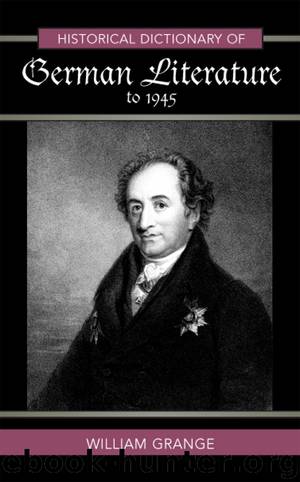Historical Dictionary of German Literature to 1945 by William Grange

Author:William Grange
Language: eng
Format: epub
ISBN: 978-0-8108-7519-7
Publisher: Scarecrow Press
– I –
IFFLAND, AUGUST WILHELM (1759–1814). Dramatist, actor, theater manager. Iffland was for two decades the leading theatrical personality in Berlin, moving with unprecedented ease within the circles of Prussian aristocratic power and influence, luxuriating in a nationwide acclaim no other actor before him had attained. He first won national attention in Mannheim, where he became the leading actor in the city’s National Theater. In 1782 he premiered the role of Karl Moor in Friedrich Schiller’s Die Räuber (The Robbers) and thereafter played a series of important roles in plays by Gotthold Ephraim Lessing, Johann Wolfgang Goethe, and August Kotzebue. Iffland’s own career as a dramatist blossomed about the same time he gained wide attention for his acting. His most wellknown (and most frequently performed) play was the comedy Die Hagestolzen (The Bachelors) in which he played an aristocratic bachelor who found true love in the arms of a simple peasant maid. His straight plays tended to be sentimental dramas much favored by middle-class audiences; in total he wrote more than 60 plays, all of them kept in the rotating repertory during his 20 years as head of the Berlin Theater Royal. There he presented the major plays of Schiller in spectacular showings, featuring enormous casts and elaborate scenic investiture. He was also among the first to stage the new verse translations of Shakespeare by August Wilhelm Schlegel. Unlike most actors of his day, Iffland was highly literate and well-read. He wrote extensively on the craft of acting, and in his two-volume Theorie der Schauspielkunst (Theory of Acting, posthumously published in 1815) he stated that actors were to assure audiences of the wholeness of characters they played, which he defined not in any realistic way but in terms of consistency, controlled gesture, and vocal resonance. Iffland believed that acting, and theater in general, had a “moral imperative” along with a kind of national mission. German actors had it in them, he believed, to unify the Germans in ways no politician could attempt.
IMMERMANN, KARL LEBERECHT (1796–1840). Dramatist, novelist, theater manager. Immermann’s career track took a somewhat eccentric path; he distinguished himself in military service as a teenager, then as a court magistrate. He tried his hand unsuccessfully at writing plays, and toward the end of his life he became a noteworthy theater manager. In the 1830s he wrote two successful works of fiction: Die Epigonen (The Epigones, 1836) and Münchhausen (1838). The latter he subtitled “a novel in arabesques,” derived principally from the adventures described in Gottfried August Bürger’s 1786 novel of the same name. Immermann amplified Bürger’s treatment substantially, transforming it into a satire of a torpid aristocracy, living out a superfluous existence in places like the Schnick-Schnack-Schnurr, Münchhausen’s ancestral residence. Immermann took over the Düsseldorf City theater in 1835 and his management was notable for his attempt to create the first German “Shakespearean stage,” establishing the kind of platform for acting set within three-quarter round seating similar to the structure used in Elizabethan theaters, which he hoped to replicate for a production of Twefth Night.
Download
This site does not store any files on its server. We only index and link to content provided by other sites. Please contact the content providers to delete copyright contents if any and email us, we'll remove relevant links or contents immediately.
Periodization Training for Sports by Tudor Bompa(8237)
The Body: A Guide for Occupants by Bill Bryson(5065)
The MacArthur Bible Commentary by John MacArthur(4813)
The Sports Rules Book by Human Kinetics(4367)
What It Really Takes to Get Into Ivy League and Other Highly Selective Colleges by Hughes Chuck(3728)
Marijuana Grower's Handbook by Ed Rosenthal(3661)
The Sprouting Book by Ann Wigmore(3575)
The Martian by Andy Weir(3393)
Salt, Fat, Acid, Heat: Mastering the Elements of Good Cooking by Nosrat Samin(3132)
The Bread Bible by Rose Levy Beranbaum(3055)
Sapiens and Homo Deus by Yuval Noah Harari(3051)
Harry Potter 4 - Harry Potter and The Goblet of Fire by J.K.Rowling(3047)
The Marketing Plan Handbook: Develop Big-Picture Marketing Plans for Pennies on the Dollar by Robert W. Bly(3027)
Classic by Mary Berry(3000)
Martha Stewart's Baking Handbook by Martha Stewart(2845)
Screenplay: The Foundations of Screenwriting by Syd Field(2621)
The Plant Paradox by Dr. Steven R. Gundry M.D(2596)
50 Economics Classics by Tom Butler-Bowdon(2555)
The Cambridge Grammar Of The English Language by Rodney Huddleston Geoffrey K. Pullum(2409)
